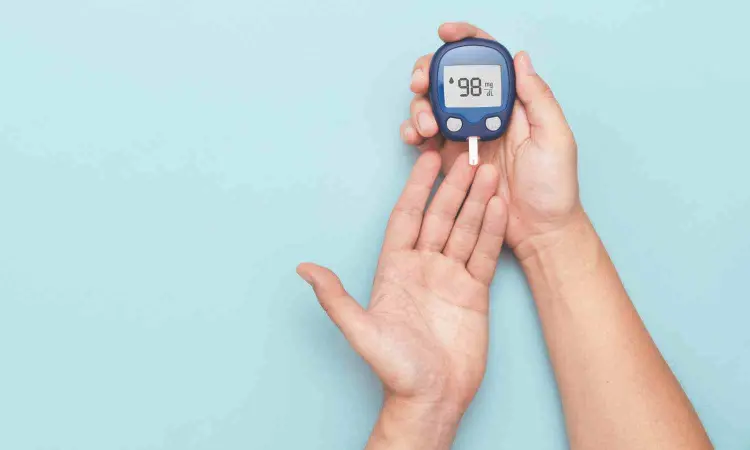- Home
- Medical news & Guidelines
- Anesthesiology
- Cardiology and CTVS
- Critical Care
- Dentistry
- Dermatology
- Diabetes and Endocrinology
- ENT
- Gastroenterology
- Medicine
- Nephrology
- Neurology
- Obstretics-Gynaecology
- Oncology
- Ophthalmology
- Orthopaedics
- Pediatrics-Neonatology
- Psychiatry
- Pulmonology
- Radiology
- Surgery
- Urology
- Laboratory Medicine
- Diet
- Nursing
- Paramedical
- Physiotherapy
- Health news
- Fact Check
- Bone Health Fact Check
- Brain Health Fact Check
- Cancer Related Fact Check
- Child Care Fact Check
- Dental and oral health fact check
- Diabetes and metabolic health fact check
- Diet and Nutrition Fact Check
- Eye and ENT Care Fact Check
- Fitness fact check
- Gut health fact check
- Heart health fact check
- Kidney health fact check
- Medical education fact check
- Men's health fact check
- Respiratory fact check
- Skin and hair care fact check
- Vaccine and Immunization fact check
- Women's health fact check
- AYUSH
- State News
- Andaman and Nicobar Islands
- Andhra Pradesh
- Arunachal Pradesh
- Assam
- Bihar
- Chandigarh
- Chattisgarh
- Dadra and Nagar Haveli
- Daman and Diu
- Delhi
- Goa
- Gujarat
- Haryana
- Himachal Pradesh
- Jammu & Kashmir
- Jharkhand
- Karnataka
- Kerala
- Ladakh
- Lakshadweep
- Madhya Pradesh
- Maharashtra
- Manipur
- Meghalaya
- Mizoram
- Nagaland
- Odisha
- Puducherry
- Punjab
- Rajasthan
- Sikkim
- Tamil Nadu
- Telangana
- Tripura
- Uttar Pradesh
- Uttrakhand
- West Bengal
- Medical Education
- Industry
Intake of aquatic plant Mankai may reduce post-meal sugar levels in diabetics, suggests study

A pioneering clinical trial conducted at Sheba Medical Center, Tel Hashomer, and Ben-Gurion University of the Negev has demonstrated that consuming Mankai-a novel cultivated aquatic plant-after meals can significantly lower blood sugar levels in patients with diabetes. The study found that Mankai's impact on reducing blood sugar levels is comparable to that of some medications.
High blood sugar, especially after meals, poses significant health risks for individuals with type 2 diabetes. This condition is often worsened by insulin resistance, which reduces the effectiveness of insulin in muscles and the liver. Chronic high blood sugar can damage blood vessels, affect the peripheral nervous system, and increase the risk of severe complications such as heart attack, stroke, kidney failure, blindness, and reduced sensation in extremities.
Prof. Amir Tirosh from Sheba Medical Center, along with Dr. Gal Tsaban and Prof. Iris Shai from Ben-Gurion University, investigated the effects of Mankai on post-meal blood sugar levels in type 2 diabetes patients. Mankai is known for its high protein, dietary fiber, and antioxidant content. The study, published in Obesity, Diabetes, and Metabolism earlier this month, found that drinking a Mankai beverage after dinner led to an approximate 20% reduction in post-meal blood sugar levels, lower peak sugar levels, and a faster return to baseline levels. This effect was observed in about two-thirds of the participants.
The trial involved 45 participants with diabetes and glycosylated hemoglobin (A1c) levels between 6.5% and 8.5%. Participants were randomly assigned to consume either a 300 ml Mankai drink or an equivalent volume of water after dinner for two weeks, followed by a switch in interventions for another two weeks. Blood sugar levels were monitored continuously using glucose sensors and standard laboratory tests throughout the study.
Mankai, which grows naturally in water and is now cultivated under controlled conditions, has shown promise in previous research for improving vascular and brain health, reducing abdominal and liver fat, and positively influencing the microbiome. Early studies also suggest that Mankai may help lower post-meal blood sugar levels even in individuals without diabetes.
Dr. Gal Tsaban remarked, “The study demonstrates that consuming Mankai after meals can lead to significant reductions in blood sugar levels. This finding introduces a promising new option for managing diabetes and reducing associated complications.”
Prof. Iris Shai added, “These results highlight the potential of Mankai as a valuable tool for diabetes management and warrant further investigation.”
Prof. Amir Tirosh concluded, “Nutrition plays a crucial role in both the development and management of diabetes. Incorporating Mankai into the diet can enhance blood sugar control and provide beneficial nutrients that support overall health.”
Reference:
Gal Tsaban et al, The effect of Mankai plant consumption on postprandial glycaemic response among patients with type 2 diabetes: A randomized crossover trial, Diabetes, Obesity and Metabolism (2024). DOI: 10.1111/dom.15840
Dr Kamal Kant Kohli-MBBS, DTCD- a chest specialist with more than 30 years of practice and a flair for writing clinical articles, Dr Kamal Kant Kohli joined Medical Dialogues as a Chief Editor of Medical News. Besides writing articles, as an editor, he proofreads and verifies all the medical content published on Medical Dialogues including those coming from journals, studies,medical conferences,guidelines etc. Email: drkohli@medicaldialogues.in. Contact no. 011-43720751


